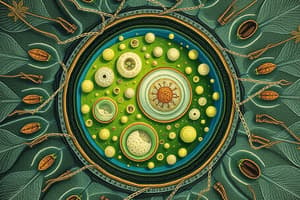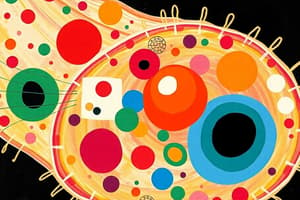Podcast
Questions and Answers
Where are ribosomes most plentiful?
Where are ribosomes most plentiful?
- Liver and muscle cells (correct)
- Lung cells
- Skin cells
- Brain cells
What is the function of the Golgi apparatus?
What is the function of the Golgi apparatus?
- Producing vital lipids
- Breaking down damaged cells
- Modifying proteins (correct)
- Capturing sunlight
Which organelle is known as the 'protein factories' of the cell?
Which organelle is known as the 'protein factories' of the cell?
- Golgi Apparatus (correct)
- Lysosomes
- Chloroplasts
- Endoplasmic Reticulum
What is the main function of chloroplasts?
What is the main function of chloroplasts?
Which organelle is capable of breaking down or digesting wastes and dead cells?
Which organelle is capable of breaking down or digesting wastes and dead cells?
In which organelle is the protein synthesis process facilitated using RNA templates?
In which organelle is the protein synthesis process facilitated using RNA templates?
What is the function of the nucleus in a cell?
What is the function of the nucleus in a cell?
Which cell organelle is responsible for producing chemical energy in the form of ATP?
Which cell organelle is responsible for producing chemical energy in the form of ATP?
What is the main role of cell organelles in a cell?
What is the main role of cell organelles in a cell?
Which organelle acts as the 'command center' of the cell?
Which organelle acts as the 'command center' of the cell?
What is the function of the nucleolus within the nucleus?
What is the function of the nucleolus within the nucleus?
How do organelles create an environment suitable for specific functions in a cell?
How do organelles create an environment suitable for specific functions in a cell?
Flashcards
Cell Organelles
Cell Organelles
Specialized subcellular structures with specific roles in cellular functions.
Nucleus
Nucleus
Cell's control center; stores DNA and regulates cell activities.
Mitochondria
Mitochondria
Powerhouses of the cell; produce ATP energy.
Ribosomes
Ribosomes
Signup and view all the flashcards
Endoplasmic Reticulum (ER)
Endoplasmic Reticulum (ER)
Signup and view all the flashcards
Rough ER
Rough ER
Signup and view all the flashcards
Smooth ER
Smooth ER
Signup and view all the flashcards
Golgi Apparatus
Golgi Apparatus
Signup and view all the flashcards
Chloroplasts
Chloroplasts
Signup and view all the flashcards
Lysosomes
Lysosomes
Signup and view all the flashcards
ATP
ATP
Signup and view all the flashcards
Nucleolus
Nucleolus
Signup and view all the flashcards
Study Notes
Cell Organelles: The Structural and Functional Components of the Cell
Cell organelles are specialized subcellular structures that play critical roles in various cellular functions, much like organs in the human body. These organelles are membrane-bound and perform specific tasks within the cell, ensuring its proper function and survival. In this article, we will delve into the definition, structure, and functions of some of the most important cell organelles.
Definition
An organelle is a subcellular structure that has one or more specific jobs to perform in the cell, much like an organ does in the body. They are membrane-bound structures that separate one function from another within the cell, allowing for high concentrations of proteins or other molecules to create an environment suitable for a particular function to occur.
Nucleus
The nucleus is often referred to as the "command center" of the cell, as it stores the cell's DNA and controls all of its activities, such as growth and metabolism, using the DNA's genetic information. Within the nucleus lies a smaller structure called the nucleolus, which houses the RNA, which helps convey the DNA's orders to the rest of the cell and serves as a template for protein synthesis.
Mitochondria
Mitochondria are the "powerhouses" of the cell, responsible for producing chemical energy in the form of ATP through cellular respiration. They are most plentiful in cells that require significant amounts of energy to function, such as liver and muscle cells.
Ribosomes
Ribosomes are the protein factories of the cell, where proteins are synthesized using templates and instructions provided by two different types of RNA. They can be found floating freely in the cell's cytoplasm or embedded within the endoplasmic reticulum.
Endoplasmic Reticulum (ER)
The ER is a membranous organelle that shares its membrane with the nucleus. Some portions of the ER, known as the rough ER, are studded with ribosomes and involved with protein manufacture. The rest of the organelle, called the smooth ER, serves to produce vital lipids.
Golgi Apparatus
The Golgi apparatus is responsible for modifying proteins produced by the rough ER. It searches the protein's amino acid sequences for specialized "codes" and modifies them accordingly. These processed proteins are then stored in the Golgi or packed in vesicles to be shipped elsewhere in the cell.
Chloroplasts
Chloroplasts are found in plant and some algae cells and are the site of photosynthesis, where the sun's energy is transformed into glucose for food. They contain the pigment chlorophyll, which captures the sun's energy to produce glucose.
Lysosomes
Lysosomes are known as "suicidal bags" because they are capable of breaking down or digesting all the wastes, dead, and damaged cells.
In conclusion, cell organelles are essential components of eukaryotic cells, each with their unique structure and function. They play a crucial role in maintaining the cell's well-being and contribute to the overall functioning of the organism.
Studying That Suits You
Use AI to generate personalized quizzes and flashcards to suit your learning preferences.




